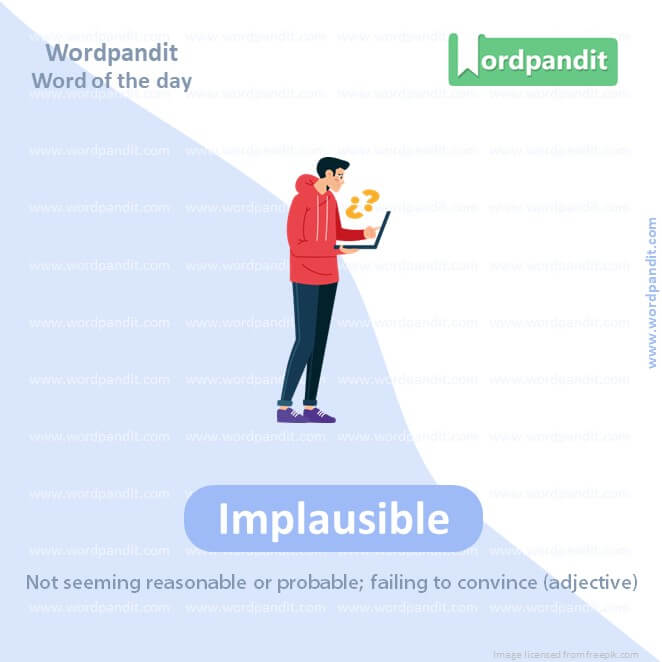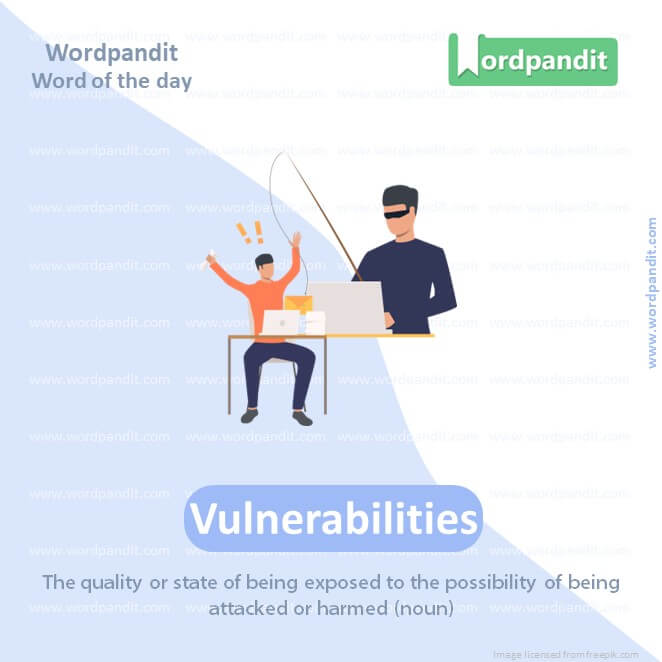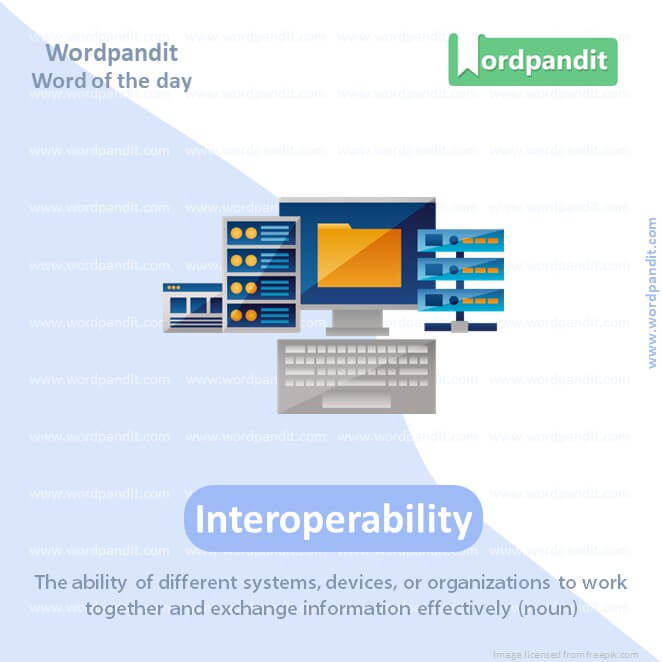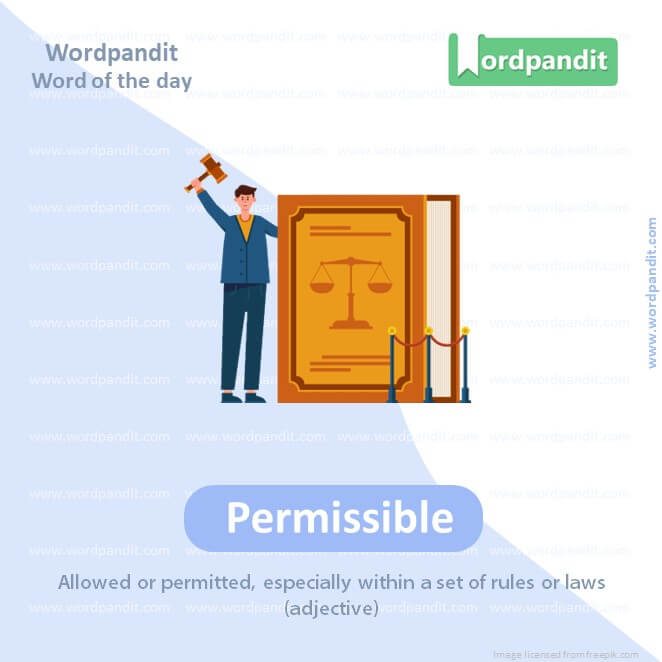Daily Vocabulary Words: List of Daily Used Words in Leading Indian Newspapers
Hi there. Welcome to this special section @ Wordpandit. Our endeavour here is straightforward: highlighting daily vocabulary words that you would come across in leading newspapers in the country. We have included the following newspapers in our selection:
• The Times of India
• The Economic Times
• Hindustan Times
• Mint
• Indian Express
We are putting in extensive work to develop your vocabulary. All you have to do is be regular with this section and check out this post daily. This is your repository of commonly used words; essentially, we are posting a list of daily used words. Hence, this has significant practical application as it teaches you words that are commonly used in leading publications mentioned above.
Visit the website daily to learn words from leading Indian newspapers.

WORD-1: Implausible
CONTEXT: They may be right unless Washington’s claim — however implausible — that the attack on the MV Chem Pluto came from Iran is proven correct, in which case New Delhi may need to revisit its calculus.
SOURCE: Indian Express
EXPLANATORY PARAGRAPH: Imagine someone telling you that a pig can fly. That sounds really unlikely, right? Implausible is when something seems like it couldn’t be true or real because it’s so unlikely or unbelievable.
MEANING: Not seeming reasonable or probable; failing to convince (adjective).
PRONUNCIATION: im-PLAW-zuh-buhl
SYNONYMS: Unlikely, Unbelievable, Unconvincing, Doubtful, Unimaginable.
USAGE EXAMPLES:
1. The idea seemed implausible to everyone.
2. He gave an implausible excuse for being late.
3. The plot of the movie was somewhat implausible.
4. Her story was so implausible that nobody believed it.

WORD-2: Vulnerabilities
CONTEXT: the US administration directed the department of homeland security to launch a new Supply Chain Resilience Center with the priority of “addressing supply chain risks resulting from threats and vulnerabilities inside US ports”.
SOURCE: Hindustan Times
EXPLANATORY PARAGRAPH: Think about when you are sick and can’t go out to play. You’re not as strong as usual. Vulnerabilities are like weaknesses or things that can easily hurt or affect you, like being sick makes you weak to more sickness.
MEANING: The quality or state of being exposed to the possibility of being attacked or harmed (noun).
PRONUNCIATION: vul-ner-uh-BIL-i-tees
SYNONYMS: Weaknesses, Risks, Exposures, Liabilities, Susceptibilities.
USAGE EXAMPLES:
1. The security team checked the system for vulnerabilities.
2. His lack of experience was one of his major vulnerabilities.
3. The report highlighted the vulnerabilities in the network.
4. They discussed how to protect the endangered animals’ vulnerabilities.
WORD-3: Erratically
CONTEXT: Spoofing, too, while useful for confusing drone control systems, often leads to the target behaving erratically.
SOURCE: Indian Express
EXPLANATORY PARAGRAPH: Imagine a butterfly flying, going here and there, not in a straight line. Erratically is like that. It’s when something moves or behaves in a way that is not regular, predictable, or expected.
MEANING: In a manner that is not even or regular in pattern or movement; unpredictably (adverb).
PRONUNCIATION: uh-RAT-i-kuh-lee
SYNONYMS: Unpredictably, Irregularly, Unevenly, Randomly, Sporadically.
USAGE EXAMPLES:
1. The car was moving erratically on the road.
2. His mood changed erratically.
3. The stock market has been performing erratically lately.
4. She answered the questions erratically.

WORD-4: Rehearsed
CONTEXT: They planned and rehearsed for any and every situation — from a 32-inch horizontal rescue, to a 22-inch vertical rescue, where we would have to cut metal girders, 90 metres down, for access.
SOURCE: Indian Express
EXPLANATORY PARAGRAPH: Think about practicing for a school play. You go over your lines again and again. Rehearsed is when you practice something many times before doing it in front of others, like learning your lines for the play.
MEANING: Practiced or repeated an activity or performance in preparation for a public presentation (verb).
PRONUNCIATION: ree-HURST
SYNONYMS: Practiced, Prepared, Trained, Refined, Polished.
USAGE EXAMPLES:
1. They rehearsed the dance routine for hours.
2. He had rehearsed his speech many times.
3. The band rehearsed every day for the concert.
4. The play was well-rehearsed and went smoothly.

WORD-5: Interoperability
CONTEXT: The only thing that can be said with certainty is that overcoming the Houthi challenge will require improvisation, operational coordination, and a high order of interoperability between coalition partners.
SOURCE: Indian Express
EXPLANATORY PARAGRAPH: Imagine using LEGO bricks from different sets to build something. Even though they are from different sets, they still fit together. Interoperability is like that. It’s when different systems or devices can work together or use each other’s parts without any problems.
MEANING: The ability of different systems, devices, or organizations to work together and exchange information effectively (noun).
PRONUNCIATION: in-ter-OP-er-uh-bil-i-tee
SYNONYMS: Compatibility, Compatibleness, Integration, Conformance, Cooperation.
USAGE EXAMPLES:
1. The new software was designed for better interoperability with other tools.
2. Interoperability is key in multi-brand tech environments.
3. They discussed the interoperability of different security systems.
4. The organization focused on the interoperability of its global teams.

WORD-6: Permissible
CONTEXT: States party to the Convention are allowed to carry out research for prophylactic, protective or other peaceful purposes, without specifying permissible types and quantities of pathogens.
SOURCE: Hindustan Times
EXPLANATORY PARAGRAPH: Think about rules at home, like being allowed to watch TV for an hour. Permissible means something is allowed or OK to do based on the rules or laws, like watching TV for that hour.
MEANING: Allowed or permitted, especially within a set of rules or laws (adjective).
PRONUNCIATION: per-MIS-uh-buhl
SYNONYMS: Allowed, Acceptable, Legal, Authorized, Legitimate.
USAGE EXAMPLES:
1. Parking is only permissible in designated areas.
2. The use of calculators was permissible during the test.
3. It’s not permissible to take photos inside the museum.
4. The contract outlines what is permissible and what isn’t.
WORD-7: Tenacity
CONTEXT: the courage and tenacity of the rat-hole miners and those who worked for long hours for the cutting operations inside the pipe were truly inspirational.
SOURCE: Indian Express
EXPLANATORY PARAGRAPH: Imagine trying to climb a tree, falling, and trying again until you make it. Tenacity is like that. It’s when you keep trying and don’t give up, even when things are hard.
MEANING: The quality of being very determined; persistence (noun).
PRONUNCIATION: tuh-NAS-i-tee
SYNONYMS: Determination, Persistence, Grit, Resilience, Perseverance.
USAGE EXAMPLES:
1. Her tenacity helped her succeed in her studies.
2. He is known for his tenacity in business negotiations.
3. The team’s tenacity led them to victory.
4. Tenacity is important in achieving long-term goals.
WORD-8: Conspiracy
CONTEXT: The Lancet published a letter in February 2020, signed by several virologists, which dubbed the lab leak proposition a conspiracy theory and suggested that the virus was transmitted to humans through natural zoonosis.
SOURCE: Hindustan Times
EXPLANATORY PARAGRAPH: Think about a group of friends planning a secret surprise party. Conspiracy is like that, but it’s usually about planning something bad or illegal in secret.
MEANING: A secret plan by a group to do something unlawful or harmful (noun).
PRONUNCIATION: kuhn-SPIR-uh-see
SYNONYMS: Plot, Scheme, Intrigue, Cabal, Collusion.
USAGE EXAMPLES:
1. They were charged with conspiracy to commit robbery.
2. The book is about a political conspiracy.
3. A conspiracy theory spread on social media.
4. He suspected a conspiracy behind the sudden resignation.
WORD-9: Equivocation
CONTEXT: The Chinese government’s equivocation, the fragmented, obfuscatory facts it provided, its punitive measures against those demanding greater transparency, and the suppression of information have only created growing suspicion.
SOURCE: Hindustan Times
EXPLANATORY PARAGRAPH: Imagine someone answering a question but not giving a clear answer, making you more confused. Equivocation is like that. It’s when someone uses unclear language to hide the truth or to avoid making a decision.
MEANING: The use of ambiguous language to conceal the truth or to avoid committing to a decision (noun).
PRONUNCIATION: ee-KWIV-oh-kay-shun
SYNONYMS: Ambiguity, Prevarication, Evasion, Dodging, Double-talk.
USAGE EXAMPLES:
1. The politician was accused of equivocation.
2. His equivocation on the matter frustrated many.
3. Equivocation in her response raised doubts.
4. The witness’s equivocation led to more questioning.
WORD-10: Passable
CONTEXT: The Border Roads Organisation (BRO) made quick work of creating passable roads at the site for the placement of all this equipment.
SOURCE: Indian Express
EXPLANATORY PARAGRAPH: Imagine drawing a picture that isn’t your best but still looks okay. Passable means something is good enough, but not the best. It’s like saying, “Well, it’s not great, but it’s not bad either.”
MEANING: Just good enough to be acceptable; satisfactory but not excellent (adjective).
PRONUNCIATION: PAS-uh-buhl
SYNONYMS: Adequate, Acceptable, Satisfactory, Decent, Tolerable.
USAGE EXAMPLES:
1. The road was rough but passable.
2. His French was passable, allowing basic communication.
3. The performance was passable, but not remarkable.
4. The meal was passable, but we’ve had better.
Vocabulary list
In navigating the seas of language learning, a ‘vocabulary list’ can often be a dependable guiding star. These collections of words serve as a focused learning tool, yet the technique of mastering a ‘vocabulary list’ effectively requires more than simple perusal. It calls for a smart, sustained approach that amalgamates understanding, memory, and application.
Exploring a ‘vocabulary list’ should be more than a one-way trip. It ought to be more like a round trip, wherein you learn the words, come back to review them, and then set out again for a new voyage. This repeated interactive way of exploring the ‘vocabulary list’ aids in solid memory retention and effective learning.
Next, while dealing with a ‘vocabulary list’, employing memory-boosting techniques can bolster your retention substantially. Here, mechanisms like spaced repetition systems and flashcards can simplify and streamline the process. Moreover, associating words on your ‘vocabulary list’ with visual cues or personal stories can help your brain make strong connections, strengthening your recall ability.
However, the most crucial aspect of learning from a ‘vocabulary list’ is active application. Conquering a list without using the words in real-world contexts might leave you with fleeting knowledge. Hence, make it a point to integrate these learnt words into your daily interactions, be it on social media, in email exchanges, or casual conversations. The regular utilization reinforces your understanding and brings the ‘vocabulary list’ to life.
Conclusively, the ‘vocabulary list’ is a treasure trove in a language learner’s quest, waiting to be unlocked strategically. Through the trinity of review, memory-enhancing techniques, and active application, one can master any ‘vocabulary list’. So, take charge of your learning journey and set sail with your ‘vocabulary list’, charting the vast and fascinating seas of language.













